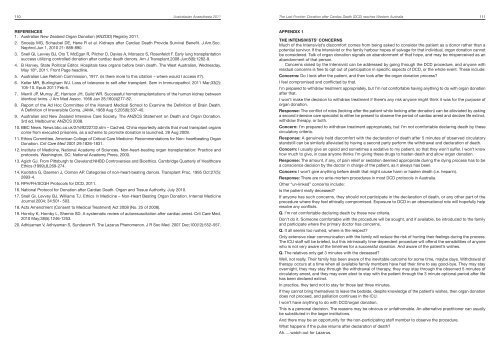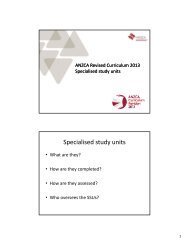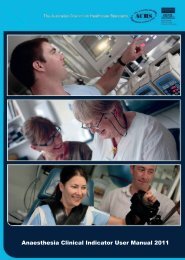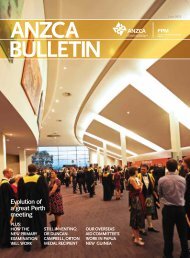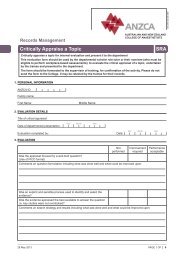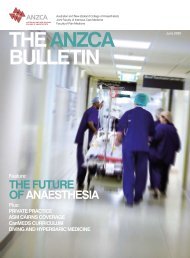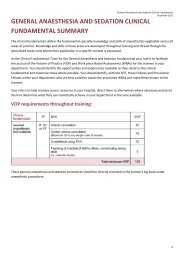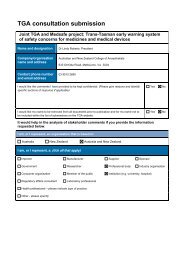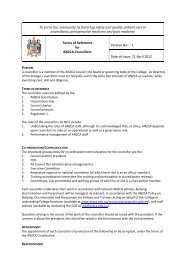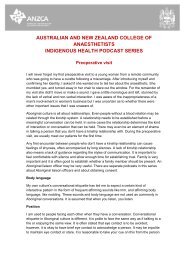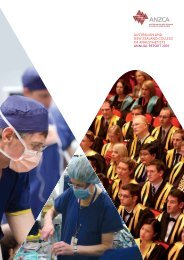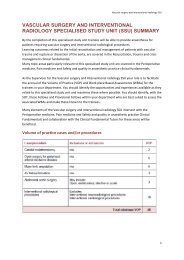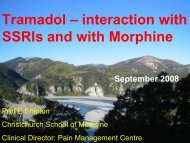108 <strong>Australasian</strong> <strong>Anaesthesia</strong> <strong>2011</strong>The Last Frontier: Donation after Cardiac Death (DCD) reaches Western Australia 109The Theatre Timeline is the important one for effective donation retrieval surgery.The ICU Timeline describes the events leading up to withdrawal of therapy, <strong>and</strong> is the cornerstone for everyoneinvolved feeling comfortable that the right thing has been done for the deceased. The DCD Protocols 15 for theindividual hospitals provide a detailed description of the donation process.Operating Theatre involvement usually comes at the end of a protracted stay in the Intensive Care Unit, where thepatient’s outcome has become more <strong>and</strong> more apparent to everyone involved in their care, as well as to the patient’srelatives. The patient may have been in the ICU for a week or more, <strong>and</strong> it is a common feeling at the bedside vigilthat the patient should be allowed to pass away without too much delay.The hours or days of coming to terms with inevitable death are often not visible to the theatre or anaesthesiastaff involved in the final retrieval surgery. The efficiency of withdrawal of therapy <strong>and</strong> subsequent close analysisof the patient’s progress, <strong>and</strong> declaration of death if it occurs, may then seem cold <strong>and</strong> calculated, maybe evenrushed <strong>and</strong> undignified. This should be far from the case for the relatives. They must be informed of every stepneeded for a successful transplant outcome, <strong>and</strong> may see organ donation as the only positive to be drawn fromthe patient’s passing. Most relatives do not choose to stay with the deceased for the optional time after declarationof death, as they may well have said their farewells at the bedside over the preceding days, or choose to say theirfinal farewell during the 5 minutes observation of cardiac st<strong>and</strong>still. Infrequently, the family has been unable torelinquish contact with the deceased, <strong>and</strong> the donation process is consequently ab<strong>and</strong>oned. The family then staysto grieve at the bedside in the ICU, <strong>and</strong> the theatre staff are informed of cancellation of the potential donation.TIME PRESSURES IN THE PROCEDUREThe practice of DCD involves organ donation after the patient’s heart has stopped beating, <strong>and</strong> since there isprogressive organ damage the longer someone is left with impaired circulation, it can only be successful in patientswho have gone from an intact circulation to circulatory arrest over a relatively short period of time. The anaesthetistwill be asked to accompany the patient from the Intensive Care Unit (ICU) to the Operating Theatre (OT), or to beprepared to receive the patient in the OT without a great deal of proximate warning. Timing <strong>and</strong> co-ordination withICU are crucial to successful donation. The anaesthetist has a critical role in facilitating lung retrieval surgery, bytimely re-intubation of the patient in the OT <strong>and</strong> possibly careful lung re-inflation as directed by the surgeon, toallow dissection <strong>and</strong> optimise early lung function in the recipient.The patient will only be transferred to theatre if his/her circulation stops within 90 minutes of withdrawal ofartificial ventilatory <strong>and</strong> circulatory support.Time-limits for ischaemia have been set based on experience of organ function in recipients:For the liver, cardiac arrest within 30 minutes of withdrawal of therapy is the maximum warm ischaemia assessedas tolerable, to avoid ischaemic strictures in the finer biliary connections.For the kidneys, the limit of this warm ischaemic time is set at 60 minutes in WA at present, although there ison-going review of acceptable criteria.The DCD patient’s lungs have proven the most resilient organ to warm ischaemic damage, possibly because ofthe proximity of oxygen-containing air <strong>and</strong> the lesser need for circulating blood to get this oxygen to the cells tomaintain viability. In fact, lungs retrieved from DCD donors perform at least as well as lungs retrieved after braindeath 3 , with conjecture that the massive release of cytokines <strong>and</strong> catecholamines showering through the pulmonarycirculation at the time of brain herniation might be a major contributor to DBD lung injury.“ANAESTHESIA” FOR THE DECEASEDWhile the deceased patient does not require sedation, analgesia or anaesthesia, airway skills will be needed if thereis the hope of lung retrieval. Depending on the donor hospital, anaesthetists may or may not be required for purelyabdominal organ retrieval.Anaesthetists in most hospitals will be welcome to attend, to enhance familiarity, comfort <strong>and</strong> underst<strong>and</strong>ingof the process.There should be few or no medications to administer, other than heparin subsequent to donation surgery. Gentleventilation (with extreme caution to avoid major thoracic excursions that might generate forward flow of the circulation)may be requested by the surgeon.Other than securing the airway in a timely fashion, to protect the lungs from passive soiling that would precludetransplant, there is little role for the anaesthetist other than to ensure that resuscitative efforts (against the patient’swishes <strong>and</strong> interests) do not occur.THE ROLE OF ANAESTHESIA: LUNG DONATIONThe Alfred Hospital’s DCD lung transplant experience in Melbourne has suggested that DCD lungs may work betterthan lungs from Donation after Brain Death (DBD) donors, 3 results that have been confirmed by overseas publications.We had to include the potential for lung donation in our WA protocols, <strong>and</strong> this would mean re-intubation <strong>and</strong>careful, delayed re-inflation, if it were to be successful.So DCD lung retrieval will require active participation by an anaesthetist.Perhaps the greatest fear in the DCD procedure is over-vigorous ventilation of the patient’s lungs, potentiallyresulting in transient return of the patient’s recently ceased circulation. 19,20 Most patients will have suffered a primarybrain injury, stroke or trauma, but their cardiovascular system may have been unharmed. Young patients who haverecently suffered a circulatory arrest could conceivably get venous return <strong>and</strong> transient restoration of circulation iftheir thoracic cage is unnecessarily inflated <strong>and</strong> deflated.So while re-intubation may be needed for lung retrieval surgery, early re-ventilation is not to be performed. Theminimum gentle delayed re-inflation required by the surgeon for clear dissection margins or lung function is all thatshould be contemplated. This may amount to applying PEEP alone.ENGAGING ANAESTHETISTSWith a little trepidation, we set out to describe DCD to <strong>Anaesthesia</strong> Departments. They would surely take pleasurein pointing out non-sequiturs, mutually exclusive ethical conundra <strong>and</strong> potential catastrophes. It was just the perfectstorm for DCD.So how did it go?We weren’t disappointed! Lively exchanges of opinion, reluctant participation, antagonism, enthusiasm <strong>and</strong>left-field ideas came freely. The suggestion that we were asking anaesthetists to be complicit in murder took us bysurprise (it’s hard to kill a deceased person). Or that we were asking anaesthetists to help perform procedures onthe nearly-deceased. These reactions, while isolated, were very unsettling.There will always be people who do not feel comfortable with organ donation. While the general public may bemore comfortable with the idea of organ donation after cardiac death, sustained exposure to brain-dead donationby the medical profession has left doctors more comfortable with that route.Anaesthetists we contacted were more comfortable with the idea of taking a pink person with an intact circulation,on a ventilator, who had been declared deceased by brain death criteria (a declaration in which they had taken nopart, <strong>and</strong> which they had not witnessed), to the operating theatre to assist with organ donation surgery, than theywere to consider taking a cool, grey, pulseless, apnoeic deceased person to the operating theatre for the samesurgery.DCD’S PLACE IN ORGAN DONATION AND SOCIETYDCD has already contributed to the increase in lung <strong>and</strong> kidney cadaveric donation by about 10-30% in Australiaover the last few years, <strong>and</strong> to an additional alternative in end-of-life care in the ICU. This 30% share of deceaseddonation should persist, <strong>and</strong> increased awareness of the donation option is vital at a medical <strong>and</strong> community level.The financial benefits for successful renal donation amount to a recurring saving of at least $80,000 per annumper person released from a dialysis unit, minus the initial costs of donation surgery <strong>and</strong> immuno-surveillance.Successful lung donation occurs in an age-group where not only is there improved quality of life <strong>and</strong> activity<strong>and</strong> longevity, but increased productivity in terms of active participation in the work-force.These “financial benefits” are quite aside from the overwhelming personal benefits.Living related donation <strong>and</strong> paired-exchange programmes for kidney donation should exceed these benefitsfrom DCD, <strong>and</strong> already in North America <strong>and</strong> parts of Europe, living kidney donation accounts for between 30 <strong>and</strong>50% of all kidney donation.CONCLUSIONDCD does present ethical <strong>and</strong> philosophical questions to participants. It does commit an operating theatre to thedonation process for a session, <strong>and</strong> there is only an 80% chance that the procedure will go ahead.It can free two people from dialysis machines, improving both quality of life <strong>and</strong> longevity, <strong>and</strong> it can give decadesof good quality life to young lung recipients.Organ donation is possibly the only procedure in Intensive Care medicine for which a Business Plan can havefinancial merit. And that’s quite aside from the personal <strong>and</strong> social effects on one young patient with respiratoryfailure, <strong>and</strong> two other patients disconnecting themselves from renal units.Carried out carefully, following the wishes of the deceased person, it should provide benefit to their family,participants, recipients, <strong>and</strong> respect for the deceased.While the concept of cardiac death may be better accepted by the public than the concept of brain death, lackof familiarity with DCD has left doctors uncertain about its place in health care. By the time of going to press, W.A.should be more comfortable with offering DCD as an infrequent but almost routine end-of-life option.POST-SCRIPTWA has now ventured forward with three successful DCD procedures in early <strong>2011</strong>. A few barriers were broken,including transfer of one of the patients from the private sector to a DCD-performing hospital, based on the patient’sclear ante-mortem discussions with family. One patient successfully donated her lungs after suffering a cardiacarrest from pulmonary embolism. One patient became a kidney donor where the primary injury had been nonneurologic.Our donor co-ordinators have gone from ambivalence to proprietary in their attitude to DCD, while thesupport for DCD in the Intensive Care Units continues to reflect long-held views on organ donation in general.<strong>Anaesthesia</strong> has participated effectively in all three events, thanks to strong leadership <strong>and</strong> a positive attitude atthe performing hospital.
110 <strong>Australasian</strong> <strong>Anaesthesia</strong> <strong>2011</strong>The Last Frontier: Donation after Cardiac Death (DCD) reaches Western Australia 111REFERENCES1. <strong>Australian</strong> <strong>New</strong> Zeal<strong>and</strong> Organ Donation (ANZOD) Registry <strong>2011</strong>.2. Snoeijs MG, Schaubel DE, Hene R et al. Kidneys after Cardiac Death Provide Survival Benefit. J.Am.Soc.Nephrol.Jun 1, 2010 21: 888-890.3. Snell GI, Levvey BJ, Oto T, McEgan R, Pilcher D, Davies A, Morasco S, Rosenfeldt F. Early lung transplantationsuccess utilizing controlled donation after cardiac death donors. Am J Transplant.2008 Jun;8(6):1282-9.4. B Harvey, State Political Editor. Hospitals take organs before brain death. The West <strong>Australian</strong>, Wednesday,May 18 th , <strong>2011</strong>. Front Page headline.5. <strong>Australian</strong> Law Reform Commission, 1977. (is there more to this citation – where would I access it?).6. Keller MR, Burlingham WJ. Loss of tolerance to self after transplant. Sem in Immunopathol. <strong>2011</strong> Mar;33(2):105-10. Epub <strong>2011</strong> Feb 6.7. Merrill JP, Murray JE, Harrison JH, Guild WR. Successful homotransplantations of the human kidney betweenidentical twins. J Am Med Assoc. 1956 Jan 28;160(4)277-82.8. Report of the Ad Hoc Committee of the Harvard Medical School to Examine the Definition of Brain Death.A Definition of Irreversible Coma. JAMA. 1968 Aug 5;205(6):337-40.9. <strong>Australian</strong> <strong>and</strong> <strong>New</strong> Zeal<strong>and</strong> Intensive Care Society. The ANZICS Statement on Death <strong>and</strong> Organ Donation.3rd ed. Melbourne: ANZICS 2008.10. BBC <strong>New</strong>s. <strong>New</strong>s.bbc.co.uk/2/hl/8222732.stm – Cached. China reportedly admits that most transplant organscome from executed prisoners, as a scheme to promote donation is launched. 26 Aug 2009.11. Ethics Committee, American College of Critical Care Medicine: Recommendations for Non- heartbeating OrganDonation. Crit Care Med 2001;29:1826-1831.12. Institute of Medicine, National Academy of Sciences. Non-heart-beating organ transplantation: Practice <strong>and</strong>protocols. Washington, DC: National Academy Press, 2000.13. Agich GJ. From Pittsburgh to Clevel<strong>and</strong>:NHBD Controversies <strong>and</strong> Bioethics. Cambridge Quarterly of HealthcareEthics (1999),8,269-274.14. Kootstra G, Daemen J, Oomen AP. Categories of non-heart-beating donors. Transplant Proc. 1995 Oct:27(5):2893-4.15. RPH/FH/SCGH Protocols for DCD, <strong>2011</strong>.16. National Protocol for Donation after Cardiac Death. Organ <strong>and</strong> Tissue Authority. July 2010.17. Snell GI, Levvey BJ, Williams TJ. Ethics in Medicine – Non-Heart Beating Organ Donation. Internal MedicineJournal 2004; 34:501- 503.18. Acts Amendment (Consent to Medical Treatment) Act 2008 (No. 25 of 2008).19. Hornby K, Hornby L, Shemie SD. A systematic review of autoresuscitation after cardiac arrest. Crit Care Med.2010 May;38(5):1246-1253.20. Adhiyaman V, Adhiyaman S, Sundaram R. The Lazarus Phenomenon. J R Soc Med. 2007 Dec;100(12):552–557.APPENDIX 1THE INTENSIVISTS’ CONCERNSMuch of the Intensivist’s discomfort comes from being asked to consider the patient as a donor rather than apotential survivor. If the Intensivist or the family harbour hopes of salvage for that individual, organ donation cannotbe considered. Talk of organ donation signals an ab<strong>and</strong>onment of that hope, <strong>and</strong> may be misperceived as anab<strong>and</strong>onment of that person.Concerns raised by the Intensivist can be addressed by going through the DCD procedure, <strong>and</strong> anyone withresidual concerns is free to opt out of participation in specific aspects of DCD, or the whole event. These include:Concerns: Do I look after the patient, <strong>and</strong> then look after the organ donation process?I feel compromised <strong>and</strong> conflicted by that.I’m prepared to withdraw treatment appropriately, but I’m not comfortable having anything to do with organ donationafter that.I won’t make the decision to withdraw treatment if there’s any risk anyone might think it was for the purpose oforgan donation.Response: The conflict of roles (looking after the patient while looking after donation) can be alleviated by askinga second intensive care specialist to either be present to observe the period of cardiac arrest <strong>and</strong> declare life extinct,withdraw therapy, or both.Concern: I’m prepared to withdraw treatment appropriately, but I’m not comfortable declaring death by thesecirculatory criteria.Response: A genuinely held discomfort with the declaration of death after 5 minutes of observed circulatoryst<strong>and</strong>still can be similarly alleviated by having a second party perform the withdrawal <strong>and</strong> declaration of death.Concern: I usually give an opioid <strong>and</strong> sometimes a sedative to my patient, so that they won’t suffer. I won’t knowhow much to give, in case anyone thinks I’m giving these drugs to hasten death <strong>and</strong> allow organ donation.Response: The amount, if any, of pain relief or sedation deemed appropriate during the dying process has to bea conscience decision by the doctor in charge of the patient, as it always has been.Concern: I won’t give anything before death that might cause harm or hasten death (i.e. heparin).Response: There are no ante-mortem procedures in most DCD protocols in Australia.Other “un-linked” concerns include:Is the patient really deceased?If anyone has such concerns, they should not participate in the declaration of death, or any other part of theprocedure where they feel ethically compromised. Exposure to DCD in an observational role will hopefully helpresolve any conflicts.Q. I’m not comfortable declaring death by these new criteria.Don’t do it. Someone comfortable with the procedure will be sought, <strong>and</strong> if available, be introduced to the family<strong>and</strong> participate where the primary doctor has concerns.Q. It all seems too rushed, where is the respect?Only extensive clear communication with the family will reduce the risk of hurting their feelings during the process.The ICU staff will be briefed, but this intrinsically time-dependent procedure will offend the sensibilities of anyonewho is not very aware of the timelines for a successful donation. And aware of the patient’s wishes.Q. The relatives only get 3 minutes with the deceased?Well, not really. Their family has been aware of the inevitable outcome for some time, maybe days. Withdrawal oftherapy occurs at a time when all available family members have had their time to say good-bye. They may stayovernight, they may stay through the withdrawal of therapy, they may stay through the observed 5 minutes ofcirculatory arrest, <strong>and</strong> they may even elect to stay with the patient through the 3 minute optional period after lifehas been declared extinct.In practice, they tend not to stay for those last three minutes.If they cannot bring themselves to leave the bedside, despite knowledge of the patient’s wishes, then organ donationdoes not proceed, <strong>and</strong> palliation continues in the ICU.I won’t have anything to do with DCD/organ donation.This is a personal decision. The reasons may be obvious or unfathomable. An alternative practitioner can usuallybe substituted in the larger institutions.And there may be an opportunity for the non-participating staff member to observe the procedure.What happens if the pulse returns after declaration of death?Ah…..watch out for Lazarus.


